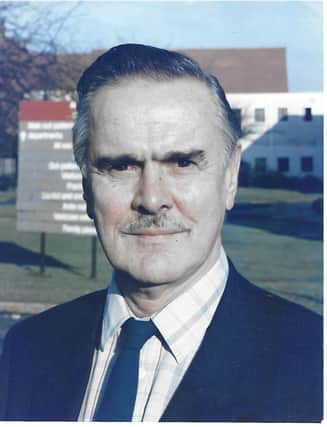Obituary: David Player, Scottish physician and public health pioneer


When David Player returned from Scotland’s 1982 World Cup foray the country had experienced its habitual first round exit, but he came home triumphant, having achieved his own spectacular success.
As an ardent football fan, passionate anti-smoking campaigner and director of the Scottish Health Education Unit, he and his colleagues had sponsored the national team under the slogan “The Squad Don’t Smoke”. They were officially the World Cup’s first anti-smoking side and sported anti-smoking logos on their kit, appeared in anti-smoking posters, TV and radio adverts and flew the flag for their healthy stance, taking a giant balloon, emblazoned with the message and a lion rampant, to the tournament in Spain. Manager Jock Stein embraced Player’s determination and, though he would dearly have loved to bring home the trophy, toured schools exhorting youngsters not to start smoking, telling them that was more important “than it is for us to win the World Cup!”
Advertisement
Hide AdAdvertisement
Hide AdIt was a PR coup but no fluke: Player had shrewdly tapped into the power of football to influence, particularly among the working class and jobless where smoking-related diseases were taking a fatal toll on lives. He also harnessed mass media initiatives to get his messages across to the widest audience and, working alongside a talented team of medical and media specialists, their innovative campaigns began to make a positive difference to the health of the nation.
He went on to be director general of the Health Education Council, to continue his fight against the “enemies of health”, strive to reduce unavoidable health inequalities and uphold the socialist ideals and practices of the National Health Service, an institution created while he was a young medical student.
David Player was born in Glasgow’s Queen’s Park, to John Player, a detective chief inspector, and Agnes. He was educated at Calder Street Primary and Bellahouston Academy where he excelled at football and cricket, later playing both sports for British Army teams during his National Service. During his studies at Glasgow Medical School, where he qualified in 1950, he developed links with the Communist Party and later concluded, as the world tried to heal from the Second World War, that deep structural change was required.
After a spell as a junior doctor and national service in Hong Kong, where he was a captain with the Royal Army Medical Corps and learned Mandarin, he worked in accident and emergency at Glasgow Royal Infirmary. In the evenings he studied for extra qualifications in medical specialisms. By the mid-1950s, keen to enter general practice, he took a post in Cumbria serving mining villages where poverty was rife and poor working conditions left many workers suffering respiratory illnesses. Frustrated by the health inequalities he saw, he realised he wanted to effect change and move into preventative medicine.
In 1962 he secured a position as Medical Officer of Health in Dumfries where he stayed for nine years, starting preventative health programmes including Well Woman Clinics and anti-poverty initiatives. He was also active in the Labour Party and in the movement against the Vietnam War. His commitment to public health echoed the ethos of Sir John Brotherston, then Chief Medical Officer for Scotland, and in 1971 Player was given the opportunity to work for health education country-wide. Initially he was director of Prison Psychiatry before being made director of the Scottish Health Education Unit. The World Cup initiative came during the latter stages of his tenure and shortly after that memorable football outing he was appointed director General of the London-based Health Education Council (HEC), responsible for health education and promotion in England, Wales and Northern Ireland.
Spirited, courageous and with a great Glasgow sense of humour, he ruffled feathers in Whitehall with his high-profile approach and vehement opposition to the tobacco industry but he also achieved success, notably reducing the salt content in bread and pioneering the Great British Fun Run. Then, when the HEC was suddenly abolished – without his prior knowledge – and replaced by the Health Education Authority in 1987, his job disappeared.
His swansong turned out to be his previously commissioned report, The Health Divide, which demonstrated that health inequalities persisted in society, disproportionately affecting the poorest. It was said to be “political dynamite” and a press briefing was cancelled an hour ahead of its launch, just a week before the HEC’s demise. A panel of experts due to discuss it decided to go ahead anyway but Player was forbidden to attend and the debacle was a PR disaster for the Thatcher Government. Instead of being buried, it made headline news.
Player was then headhunted as director of public health for South Birmingham Health Authority, became active in the Public Health Alliance and joined Consultants for the NHS, serving on their executive.
Advertisement
Hide AdAdvertisement
Hide AdAfter retiring at 64, he did a degree in Scottish History and English Literature at St Andrews and returned to Edinburgh where he was a fervent supporter of the Homeless World Cup, attending a Holyrood function for the event when it came to the Scottish capital. He said he would always remember the sight of players gathered in the Scottish Parliament for the reception in their honour and wrote: “That is what public health should be all about – empowerment, mutual respect and the dignity of a well-earned place in a fair and socially just society.”
Predeceased by his wife Anne in 2006, he is survived by sons John and Stewart, four grandchildren and his sister Bunty.
ALISON SHAW
A message from the Editor
Thank you for reading this article. We're more reliant on your support than ever as the shift in consumer habits brought about by coronavirus impacts our advertisers.
If you haven't already, please consider supporting our trusted, fact-checked journalism by taking out a digital subscription.